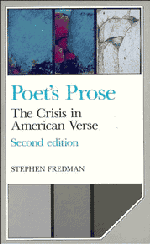Book contents
- Frontmatter
- Contents
- Preface to the second edition
- Preface to the first edition
- List of abbreviations
- Introduction: Prose and the American crisis of verse
- 1 The generative sentence: William Carlos Williams's Kora in Hell: Improvisations
- 2 “A life tracking itself”: Robert Creeley's Presences: A Test for Marisol
- 3 “He chose to include”: John Ashbery's Three Poems
- 4 The crisis at present: talk poems and the new poet's prose
- Notes
- Index
- Cambridge Studies in American Literature and Culture
Preface to the first edition
Published online by Cambridge University Press: 04 April 2011
- Frontmatter
- Contents
- Preface to the second edition
- Preface to the first edition
- List of abbreviations
- Introduction: Prose and the American crisis of verse
- 1 The generative sentence: William Carlos Williams's Kora in Hell: Improvisations
- 2 “A life tracking itself”: Robert Creeley's Presences: A Test for Marisol
- 3 “He chose to include”: John Ashbery's Three Poems
- 4 The crisis at present: talk poems and the new poet's prose
- Notes
- Index
- Cambridge Studies in American Literature and Culture
Summary
This book is an attempt to elucidate a type of writing, poet's prose, that, for various reasons, has thus far escaped attention in English. In speaking of a relatively nongeneric form, one cannot rely upon accumulated critical assumptions; thus I take a variety of vantage points in discussing the subject. The term “poet's prose” is a response to the terminological nightmare surrounding nonversified poetry. The more common “prose poem” is unsatisfactory for two reasons: It is an oxymoron aimed at defamiliarizing lyric poetry, and it remains redolent with the atmospheric sentiment of French Symbolism. “Poet's prose” escapes the oxymoron and is proposed as a more encompassing term to cover all (not only lyric) poetry written in sentences and without versification. The term is descriptive instead of normative; it applies to works that are conceived of and read as extensions of poetry rather than as contributions to one of the existing prose genres.
This book considers poet's prose of a single nationality in order to show the relationship of such a problematic form to the poetry around it. I will argue that American poet's prose, rightly understood, has occupied an especially crucial place in American poetry from Emerson's day to the present. To make this argument I engage in close readings of exemplary texts and piece together, during these readings, a critical vocabulary for speaking about poet's prose in general and American poet's prose in particular.
- Type
- Chapter
- Information
- Poet's ProseThe Crisis in American Verse, pp. xiii - xivPublisher: Cambridge University PressPrint publication year: 1990



